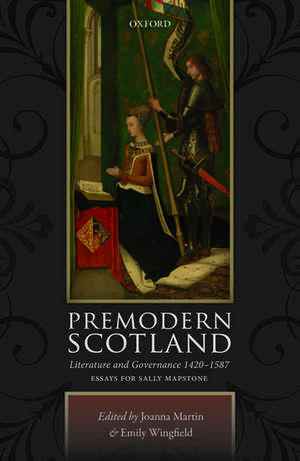Premodern Scotland: Literature and Governance 1420-1587
Editat de Joanna Martin, Emily Wingfielden Limba Engleză Hardback – 22 iun 2017
Preț: 569.89 lei
Preț vechi: 816.59 lei
-30% Nou
Puncte Express: 855
Preț estimativ în valută:
109.05€ • 114.09$ • 90.59£
109.05€ • 114.09$ • 90.59£
Carte tipărită la comandă
Livrare economică 22-28 martie
Preluare comenzi: 021 569.72.76
Specificații
ISBN-13: 9780198787525
ISBN-10: 0198787529
Pagini: 268
Ilustrații: 2 halftones
Dimensiuni: 174 x 240 x 21 mm
Greutate: 0.56 kg
Editura: OUP OXFORD
Colecția OUP Oxford
Locul publicării:Oxford, United Kingdom
ISBN-10: 0198787529
Pagini: 268
Ilustrații: 2 halftones
Dimensiuni: 174 x 240 x 21 mm
Greutate: 0.56 kg
Editura: OUP OXFORD
Colecția OUP Oxford
Locul publicării:Oxford, United Kingdom
Recenzii
Martin and Wingfield have excelled as editors in bringing together essays that both reflect and honor the scholarship of Mapstone and her influence on the academic work of so many in the field of Older Scots, and demonstrate the complexity of the state of the field. This is a particularly welcome volume that will prompt further examination of the texts and themes it showcases, not only from its contributors but also through its influence on future scholarship.
This excellent collection of essays showcases the work of some of the leading early and mid-career scholars of Older Scots literature and culture ... turn with pleasure to the careful scholarship of the essays in Premodern Scotland.
This excellent collection of essays showcases the work of some of the leading early and mid-career scholars of Older Scots literature and culture ... turn with pleasure to the careful scholarship of the essays in Premodern Scotland.
Notă biografică
Joanna Martin is Associate Professor of Middle English and Older Scots at the University of Nottingham, having been a Darby Fellow at Lincoln College, Oxford. She has published on aspects of Middle English writing, including that of Gower and Lydgate, on Anglo-Scottish literary relations, and on Older Scots literary and book history. She is the author of Kingship and Love in Scottish Poetry (Ashgate, 2008) and The Maitland Quarto: A New Edition of Cambridge, Magdalene College, Pepys Library MS 1408, published for the Scottish Text Society in 2015. Emily Wingfield is a Lecturer in English at the University of Birmingham. Previously she held a Junior Research Fellowship at Churchill College, Cambridge, and completed her D.Phil. on 'The Manuscripts and Print Contexts of Older Scots Romance' at Oxford. She has published widely on Older Scots romance and book history, and completed a monograph on The Trojan Legend in Medieval Scottish Literature (D.S. Brewer, 2014).
